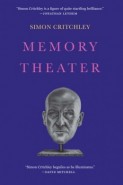
Book Review: Memory Theater by Simon Critchley

Memory Theater
Fiction by Simon Critchley
Other Press, November 2015
ISBN-13: 9781590517406
$15.95; 96 pp.
Reviewed by Bradley Babendir
After the final pages of Simon Critchley’s first work of fiction, Memory Theater, there is “a partial glossary of potential obscurities.” This, like the book, is at once enormously funny and enormously thoughtful. The book, which is small enough to swallow in a single sitting, bends the line between fiction and memoir, serious and not. At the outset, the narrator receives a box of a dead man’s belongings, and the ride goes wild from there.
The narrative, as much as this book can be said to have a narrative, is secondary to the philosophical musings that run through the main character’s mind. Most of these, as the title of the book suggests, are centered around the idea of memory, its significance, and what it means for humanity. Memory Theater masterfully weaves brutally heavy questions, such as, “If I had no memory, had I ceased to really exist…was this a kind of death in life?” with much lighter fodder to soften the philosophical blow. The humor operates as the salt and lime to Critchley’s intellectual tequila shot. It’s much easier to ask the tough questions when laughter comes with it.
On top of this, the author often offers uniquely striking and beautiful moments. This comes at the end of a chapter: “Through the art of memory, we learn to see ourselves from the perspective of the whole, from the standpoint of totality. In so doing, we become infinite, divinely human.” Although the novel is rife with references to philosophers and their work, previous familiarity with the material is far from required. Both the structure of the work and the glossary make the more academic content accessible for the layman. Still, a reader who had no interest in the field of philosophy at all might not have the patience for this book.
For those who do though, Memory Theater is a dense, thoughtful work that finds innumerable ways to surprise its readers and force them to interrogate their own assumptions. It balances what amounts to a philosophical essay with a narrative frame and elements of memoir, operating on a plane that takes the strengths of each genre and leaves their weaknesses behind. All of this, too, in a book one could finish on a short flight, though it’ll hang around in its readers’ brains for much longer than that.

Leave a Reply